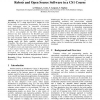53 search results - page 8 / 11 » SPEE: A Secure Program Execution Environment tool using code... |
CSFW
2011
IEEE
12 years 7 months ago
2011
IEEE
—Randomization is used in computer security as a tool to introduce unpredictability into the software infrastructure. In this paper, we study the use of randomization to achieve ...
OOPSLA
2007
Springer
14 years 1 months ago
2007
Springer
In runtime monitoring, a programmer specifies a piece of code to execute when a trace of events occurs during program execution. Previous and related work has shown that runtime m...
FECS
2009
13 years 5 months ago
2009
- This paper describes the development of a system for teaching C/C++ using LegoTM RCX Robots in a CS1 college course on introductory programming. The system has been implemented u...
OSDI
2008
ACM
14 years 7 months ago
2008
ACM
We present a new symbolic execution tool, KLEE, capable of automatically generating tests that achieve high coverage on a diverse set of complex and environmentally-intensive prog...
ACSC
2006
IEEE
14 years 1 months ago
2006
IEEE
Code obfuscation is a relatively new technique of software protection and it works by deterring reverse engineering attempts by malicious users of software. The objective of obfus...

